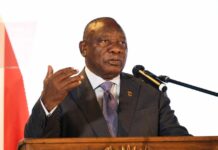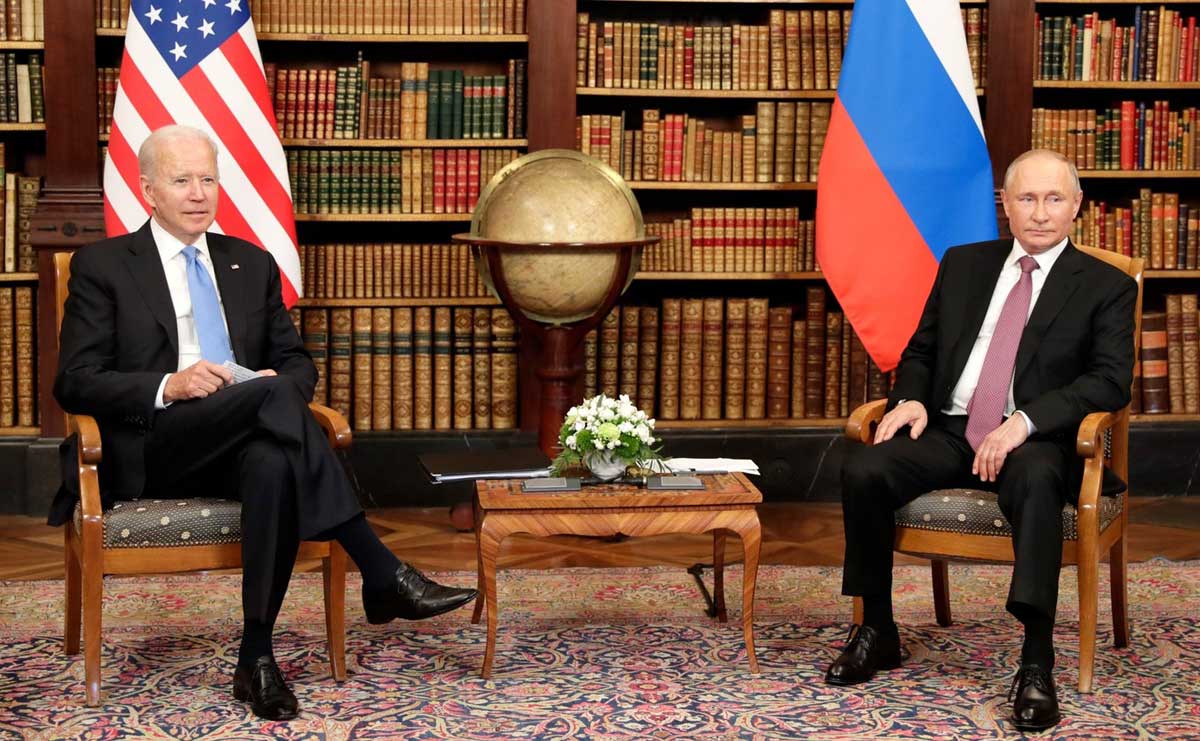“In a surrealist year…. some cool clown pressed an inedible mushroom button, and an inaudible Sunday bomb fell down, catching the president at his prayers on the 19th green.”-Lawrence Ferlinghetti, A Coney Island of the Mind (1958)
While serious questions continue to emerge from the recently-completed Geneva summit,[1] one concern should remain front and center. This is the more-or-less calculable prospect of inadvertent nuclear war, an existential hazard that is integral to America’s deterrence-based framework of national security. This prospect is still expanding.
A Process of Continuous Reassessment
What can be done? For clarifying analyses, periodic re-assessments will be needed. To begin, though an accidental nuclear war would always be inadvertent, not every inadvertent nuclear war need be the result of an accident. Other forms of unintentional nuclear conflict would be the outcome of human misjudgment and/or technical miscalculation. This is the case whether a bellum atomicum were spawned by singular nation-state error or both sides to an ongoing two-party nuclear crisis escalation.
Also significant here could be various “synergies” (whether foreseen or unanticipated) arising between particular misjudgments or miscalculations.
Conceptual understanding will always be key. In synergistic intersections, the cumulative “whole” of any specific combination must be greater than the sum of all pertinent “parts.” The quantifiable outcome of two discrete national decisions would be more consequential than a result suggested only by arithmetic summations. Moreover, this heightened importance could be tangible, intangible or somewhere in-between.
Needed Analytic Clarifications
Above all, these are complex intellectual or analytic issues. They are not mundane or trivial matters amenable to narrow political resolution. The abundant risks of deliberate nuclear war and inadvertent nuclear war could be assessed independently of one another.[2] Accordingly, US President Joe Biden should prepare to deal systematically with variously plausible manifestations of cyber-attack and cyber-war. And these high-technology threats ought to be considered in conjunction with simultaneously expanding activities of “digital mercenaries.”
In science, language matters. Dangerous false warnings could be generated by different types of technical malfunction or by third-party hacking interference, but should not be included under the causes of an inadvertent nuclear war. Rather, these false warnings would present as cautionary narratives of an accidental nuclear war. Always, both narratives warrant intellect-based elucidations. While now sounding obvious prima facie, national security decision-making during the Trump era was often incoherent and generally disjointed.
There are also issues of geometry. Recognizing the territorial loci of prospective nuclear threats to the United States, these corresponding issues should focus especially on Russia, China and North Korea. Concessions offered to Mr. Biden by Russian President Putin might not be meaningfully reassuring vis-à-vis variably unpredictable perils originating from China and/or North Korea. Reciprocally, Mr. Putin could have good reason to be concerned about US concessions offered on behalf of South Korea, Japan and/or specific NATO member states.
In strategic terms, there is more. Metaphorically, for the United States, there are additional “flies in the ointment.” In coming years, partially because Trump-era “toughness” was wholly contrived and effectively accelerated Iran’s determined efforts at nuclearization, that country, now led by a more conspicuously hardline president, will more likely and more expeditiously join the “nuclear club.” For both President Biden and President Putin,[3] such membership will substantially complicate certain critical elements of national security decision-making.
Miscalculation and Escalation Dominance
For Joe Biden’s senior policy planners, conceptual clarity should become a more evident sine qua non for resolving national security problems. In this regard, most worrisome among credible causes of an inadvertent nuclear war would be various errors in calculation committed by one or both sides. The most evident example here would likely involve those assorted misjudgments of adversarial intent or capacity that emerge in determinable conformance with crisis escalation. Such consequential misjudgments could stem from an amplified desire by one or several crisis-contending parties to achieve “escalation dominance.”[4]
Plausibly, in such foreseeable crisis conditions, all rational contenders would strive for escalation dominance without risking high odds[5] of total or near-total destruction. Expectedly, of course, wherever one or several contending adversaries would not appear suitably rational, all usual deterrence “bets” would be off. Most immediately worrisome for the United States should be North Korea. Former US President Donald Trump’s statement that he and Kim Jung Un had “fallen in love” at the Singapore Summit provides no reasonable comfort for still-thinking Americans.[6]
None at all.
Nonetheless, false comfort remains a plausible American objective. Credo quia absurdum, said the ancient philosopher Tertullian. “I believe because it is absurd.”
There exist other potential causes of an inadvertent nuclear war. These causes include flawed interpretations of computer-generated nuclear attack warnings; an unequal willingness among adversaries to risk catastrophic war; overconfidence in deterrence and/or defense capabilities on one side or the other (or both); adversarial regime changes; outright revolution or coup d’état among contending adversaries; and poorly-conceived pre-delegations of nuclear launch authority among pertinent presumptive foes.[7]
There is more. Markedly serious problems of overconfidence could be aggravated by successful tests of a nation’s missile defense operations, whether by the United States itself or by any of its relevant adversaries. Recalling Carl von Clausewitz On War, even the “simplest” problems could sometime prove “very difficult.”
Rationality and Irrationality
Strategic thinking would never be “simple.” A potential source of inadvertent nuclear war involving the United States could be “backfire” effect from variously untested strategies of “pretended irrationality.” In principle, at least, a rational enemy that had managed to convince Washington of its decisional irrationality could sometime spark an American military preemption. Conversely, an adversarial leadership that had begun to take seriously any hints of decisional irrationality in Washington might be frightened into striking first itself.
“Everything is very simple in war,” says von Clausewitz, “but even the simplest thing is very difficult.”
Once again, metaphor may be instructive. Joe Biden must be wary of “nightmare.” According to the etymologists, the root is niht mare or niht maere, the demon of the night. Dr. Johnson’s dictionary says this corresponds to Nordic mythology, which regarded nightmares as the product of demons. This would make it a play on, or a translation of, the Greek ephialtes or the Latin incubus. In all such interpretations of nightmare, the inherently non-rational idea of demonic origin is central.
Today, for the United States, the demons of nuclear strategy and nuclear war take a markedly different form. For the most part, their mien is neither confused nor frightful, but rational and ordinary. If these demons are ever thought to be sinister, it is not because America’s adversaries necessarily crave war or wanton bloodshed, but because they may be seeking maximum safety amid a rapidly growing global chaos.[8]
That primal search could be rational.
While the state of nations has always been in the “state of nature”[9] – at least since the seventeenth century and the historic Peace of Westphalia (1648) – current conditions of nuclear capacity and worldwide anarchy portend an expanding cauldron of possible aggressions.[10] Among other things, the correct explanation for such dire portents lies in the indispensability of rational decision-making to viable nuclear deterrence,[11] and in the interpenetrating fact that rational decision-making may suddenly become subject to massively corrosive deteriorations.
The Importance of Synergy
Now, even after surviving a persistently dissembling Trump strategic policy, America faces formidable national security risks that remain immediate and existential. Such risks can be fully understood only in light of believable or at least conceivable intersections arising between them. Such critical intersections are more-or-less likely (a conclusion based on formal logic, and not on any actual history); on occasion, some of these reinforcing intersections could prove synergistic. Contradicting what we first learned in primary school, this means that the “whole” of intersectional risk effects could be greater than the discernible sum of all component “parts.”[12]
Presumptively, under US Constitutional law (Article l), holding Congressional war-declaring expectations aside, any presidential order to use nuclear weapons, whether issued by an apparently irrational president or by an otherwise incapacitated one, would warrant obedience. To conclude otherwise in such incomparably dire circumstances would be law-violating. In essence, any chain-of-command disobedience in these circumstances would be impermissible on its face.
Ordering an American “First Use”
There is more. Any American president could order the first use of American nuclear weapons if this country were not under actual nuclear attack. In principle at least, some further strategic and legal distinctions need to be made between a nuclear “first use” and a nuclear “first strike.” While there does exist an elementary but still-substantive difference between these two options, it is a distinction that former President Donald Trump failed to understand. The nation survived this experience with a profoundly unsuitable president, but previous episodes of luck need not be meaningfully predictive.
Trump is gone. Still, with even a more reasonably thinking president at the helm, structural decisional risks obtain.[13] Quo Vadis? Where should President Joe Biden go from here on managing such plainly urgent security issues? A coherent and comprehensive answer will need to be prepared in response to the following basic question:
If faced with a presidential order to use nuclear weapons, and not offered sufficiently appropriate corroborative evidence of any actually impending existential threat, would the National Command Authority be: (1) be willing to disobey, and (2) be capable of enforcing such variable expressions of disobedience?
In such unprecedented crisis-decision circumstances, all authoritative decisions could have to be made in a compressively time-urgent matter of minutes, not hours or days. As far as any useful policy guidance from the past might be concerned, there could be no scientifically valid way to assess the true probabilities of principal possible outcomes. This is because all scientific judgments of probability – whatever the salient issue or subject – must be based upon the discernible frequency of pertinent past events. Any other bases could provide only a more-or-less intelligent guess.
In any prospectively relevant matters of nuclear war, there could be nopertinent past events. Though this is a fortunate absence, of course, it remains one that would stand in the way of rendering reliable decision-making predictions. Whatever the scientific obstacles, the optimal time to prepare for any such incomparably vital US national security difficulties is the present.
Facing Already-Nuclear North Korea
In the specifically urgently matter of North Korea,[14] President Biden must take special care to avoid any seat-of-the-pants Trump-style calculations. Faced with dramatic uncertainties about counterpart Kim Jung Un’s own willingness to push the nuclear envelope, America’s current president could sometime find himself faced with an intolerably stark choice. This would be deciding between outright capitulation and nuclear war.
How to choose?
To avoid being placed in any such portentously limited option environment, Mr. Biden should understand from the start that having a larger national nuclear force (a “bigger button,” to use his predecessor’s unfortunate metaphor) might not bestow any bargaining advantage. To the contrary, it could generate or reinforce unwarranted US presidential overconfidence and certain resultant forms of strategic miscalculation. In any such unfamiliar, many-sided and basically unprecedented matters, size might truly “matter,”but inversely.
Although counter-intuitive and ironic, a nuclear force of exclusively high-yield destructiveness could appear militarily less credible and/or diplomatically less persuasive.
Within the broad parameters of Realpolitik[15] or geopolitics, the field of nuclear policy decision-making is largely without tangible precedent. While the search for “escalation dominance” may be common to all imaginable sorts of military deal-making, the plausible costs of nuclear bargaining losses would likely be incomparable. After all, no other losses could reasonably be compared to losses in a nuclear war, whether intentional, inadvertent or accidental.
Never.
In such a war, whether occasioned by miscalculation, human error or hacking-type interference, there could be no identifiable “winner,” Even after the United States was able to survive the egregious moral and intellectual debilities of Donald Trump’s presidency, a number of significant and generic risks continue to obtain. Looking ahead, the very best way for America to forestall being placed in extremis atomicum is for President Joe Biden to stay focused on intellectual[16] and analytic explanatory factors. On all such complex matters, narrowly political judgments should always be deemed unworthy and extraneous.
Turning to the Poets
Sometimes the poet sees more clearly than the policy-maker.[17] Remembering Lawrence Ferlinghetti, America should never allow itself to be caught unaware on the “nineteenth green.”[18] In playing such high-stakes “games” as nuclear strategy and escalation dominance, there could be no comforting “do overs.” Instead, at any late stage of bargaining and brinksmanship, even a single and seemingly minor “loss” could prove grievously lethal and irreversible. If the recent June 2021 Swiss summit between Presidents Biden and Putin is ever to be regarded as successful, there will first have to be determinably calculable progress on several intersecting fronts.
Most important of all, perhaps, will be the prevention of inadvertent nuclear war.[19]
[1] See: https://geneva.usmission.gov/genevasummit/
[2] The respective physical harms of course would be the same. For earlier looks at the expected consequences of nuclear war effects by this author, see: Louis René Beres, Apocalypse: Nuclear Catastrophe in World Politics (Chicago: University of Chicago Press, 1980); Louis René Beres, Mimicking Sisyphus: America’s Countervailing Nuclear Strategy (Lexington, Mass: Lexington Books, 1983); Louis René Beres, Reason and Realpolitik: U.S. Foreign Policy and World Order (Lexington, Mass: Lexington Books, 1984); and Louis René Beres, Security or Armageddon: Israel’s Nuclear Strategy (Lexington, Mass: Lexington Books, 1986).
[3] Ipso facto, this “joining” would significantly impact Israel, and its own still-evolving nuclear strategy This author, Professor Louis René Beres, was Chair of “Project Daniel” (PM Sharon) in 2003-2004. See his Report to Mr. Sharon, Israel’s Strategic Future (ACPR): http://www.acpr.org.il/ENGLISH-NATIV/03-ISSUE/daniel-3.htm. See also: Louis René Beres, https://press.armywarcollege.edu/parameters/vol37/iss1/2/; Louis René Beres, https://besacenter.org/us-iran-war-israel/; and Louis René Beres, Surviving Amid Chaos: Israel’s Nuclear Strategy, Rowman and Littlefield, 2016 (2nd ed. 2018): https://paw.princeton.edu/new-books/surviving-amid-chaos-israel%E2%80%99s-nuclear-strategy.
[4] This goal would be a specific iteration of a traditional search for “victory.” But on pertinenhttps://besacenter.org/us-iran-war-israel/t risks, by this author, see, at Oxford University Press, Louis René Beres: https://blog.oup.com/2016/04/war-political-victories/
[5]The measurable criteria of “severe risk” here would necessarily remain subjective.
[6] When meeting in Singapore with Kim Jong Un on June 11, 2018, Trump dismissed all usual presidential obligations to prepare. Instead, he emphasized offhandedly: “I don’t think I have to prepare very much. It’s all about attitude.”
[7] The problem of such pre-delegations was examined by this author much earlier in his Apocalypse: Nuclear Catastrophe in World Politics (The University of Chicago Press, 1980) and in articles co-authored with General John T. Chain, a former Commander-in-Chief, US Strategic Air Command: See Professor Beres and General Chain: https://besacenter.org/living-iran-israels-strategic-imperative-2/ See also Louis René Beres and General John T. Chain, “Could Israel Safely deter a Nuclear Iran? The Atlantic, August 2012; and Professor Louis René Beres and General John T. Chain, “Israel; and Iran at the Eleventh Hour,” Oxford University Press (OUP Blog), February 23, 2012. Though dealing with Israeli rather than American nuclear deterrence, these articles are fundamentally conceptual and clarify variously common analytic policy elements.
[8] Whether it is described in the Old Testament or any other major sources of ancient Western thought, chaos can be viewed as something positive, even a source of human betterment. Here, chaos is taken as that which prepares the world for all things, both sacred and profane. As its conspicuous etymology reveals, chaos further represents the yawning gulf or gap wherein nothing is as yet, but where all civilizational opportunity must inevitably originate. Appropriately, the classical German poet Friedrich Hölderlin observed: “There is a desert sacred and chaotic which stands at the roots of the things and which prepares all things.” Even in the pagan ancient world, the Greeks thought of such a desert as logos, which should indicate to us today that it was never presumed to be starkly random or without evident merit.
[9] Says Thomas Hobbes: “But though there had never been any time wherein particular men were in a condition of war one against another, yet in all times, Kings and Persons of Sovereign Authority, because of their Independency, are in continual jealousies, and in the state and posture of Gladiators, having their weapons pointing and their eyes fixed on one another…(Leviathan).
[10] On the actual crime of aggression under international law, see: RESOLUTION ON THE DEFINITION OF AGGRESSION, Dec. 14, 1974, U.N.G.A. Res. 3314 (XXIX), 29 U.N. GAOR, Supp. (No. 31) 142, U.N. Doc. A/9631, 1975, reprinted in 13 I.L.M. 710, 1974; and CHARTER OF THE UNITED NATIONS, Art. 51. Done at San Francisco, June 26, 1945. Entered into force for the United States, Oct. 24, 1945, 59 Stat. 1031, T.S. No. 993, Bevans 1153, 1976, Y.B.U.N. 1043.
[11] In studies of world politics, rationality and irrationality have now taken on very specific meanings. More precisely, an actor (state or sub-state) is presumed determinedly rational to the extent that its leadership always values national survival more highly than any other conceivable preference or combination of conceivable preferences. Conversely, an irrational actor might not always display such a determinable preference ordering.
[12] See earlier, by this author, Louis René Beres, at Harvard National Security Journal (Harvard Law School): https://harvardnsj.org/2015/06/core-synergies-in-israels-strategic-planning-when-the-adversarial-whole-is-greater-than-the-sum-of-its-parts/
[13] See by this author, Louis René Beres, at The Bulletin of the Atomic Scientists: https://thebulletin.org/biography/louis-rene-beres/; and Louis René Beres, at US Army War College, The War Room: https://warroom.armywarcollege.edu/articles/nuclear-decision-making/
[14] See, by this author, at Yale Global: Yale University: Louis René Beres, https://archive-yaleglobal.yale.edu/content/too-late-north-korea-denuclearization. See also, by Professor Beres, at War Room (West Point): https://warroom.armywarcollege.edu/author/louis-rene-beres/
[15] The classic statement of Realpolitik or power politics in western philosophy is the comment of Thrasymachus in Plato’s Republic: “Justice is nothing else than the interest of the stronger.” (See Plato, The Republic, 29, Benjamin Jowett, tr., World Publishing Company, 1946.) See also: Cicero’s oft-quoted query: “For what can be done against force without force?” Marcus Tullus Cicero, Cicero’s Letters to his Friends, 78 (D.R. Shackleton Baily tr., Scholars Press, 1988).
[16] The Founding Fathers of the United States, including early presidents, were intellectuals. More precisely, as explained by American historian Richard Hofstadter: “The Founding Fathers were sages, scientists, men of broad cultivation, many of them apt in classical learning, who used their wide reading in history, politics and law to solve the exigent problems of their time.” See Hofstadter’s classic, Anti-Intellectualism in American Life (New York: Alfred A. Knopf, 1964), p. 145.
[17] Before “Beat” poets Lawrence Ferlinghetti, Allen Ginsberg and Jack Kerouac, there was the avant-garde of Zürich Dada, most notably Hugo Ball and Tristan Tzara. Like “Beat,” Dada urged an expanding relationship between life and art, one where art can not only enrich life, but help to better understand and elucidate it.
[18] Underlying the technical issues here are individual citizen identifications with sentiments of belligerent nationalism, identifications that were strongly encouraged by former US President Donald J. Trump. In the nineteenth century, in his posthumously published Lecture on Politics (1896), German historian Heinrich von Treitschke observed: “Individual man sees in his own country the realization of his earthly immortality.” Earlier, German philosopher Georg Friedrich Hegel opined, in his Philosophy of Right (1820), that the state represents “the march of God in the world.” The “deification” of Realpolitik, a transformation from mere principle of action to a sacred end in itself, drew its originating strength from the doctrine of sovereignty advanced in the sixteenth and seventeenth centuries. Initially conceived as a principle of internal order, this doctrine underwent a specific metamorphosis, whence it became the formal or justifying rationale for international anarchy – that is, for the global “state of nature.” First established by Jean Bodin as a juristic concept in De Republica (1576), sovereignty came to be regarded as a power absolute and above the law. Understood in terms of modern international relations, this doctrine encouraged the notion that states lie above and beyond any form of legal regulation in their interactions with each other.
[19] The emphasis here on inadvertent rather than intentional nuclear war reflects this author’s subjective judgement of relative probabilities. Also, acknowledging world politics as a system, Washington will increasingly have to consider the role of Israel’s nuclear strategy vis-à-vis a still-nuclearizing Iran, a role with patently serious and substantial implications for America’s nuclear strategy. See, for example, by this author, at Harvard National Security Journal, Harvard Law School: Louis René Beres,,https://harvardnsj.org/2014/06/staying-strong-enhancing-israels-essential-strategic-options-2/


























